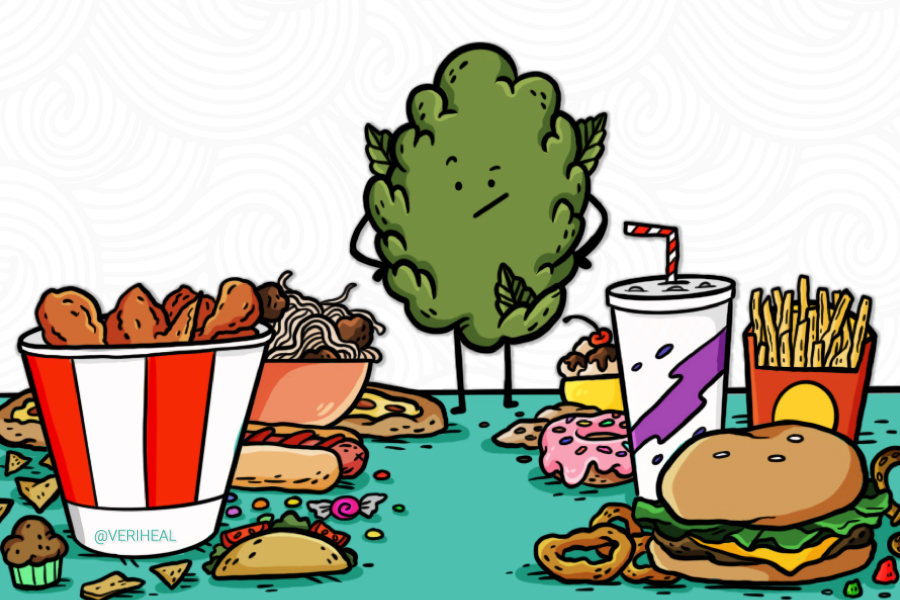We’re all familiar with it: the munchies. The desire, after smoking a joint, to settle down with a bag of chips or a favorite snack and just go to town. The munchies are an extremely common side effect of cannabis use, and for many users, an enjoyable one. It’s fun to snack! And, of course, snacking pairs well with TV watching, something else many of us love to do after we light up.
The problem with the munchies? A desire to keep on snacking whether your body is actually hungry or not. As we all know, that’s not necessarily the most healthy choice, and you might find yourself paying for it later. Plus, you could ruin your appetite for a real meal.
So what’s the solution? How can you enjoy cannabis without falling prey to the munchies?
Why Do We Get The Munchies?
If you’ve ever had the munchies yourself, you know how irrepressible they can be. The urge to go and get a snack is overpowering, even though you may not be hungry at all.
That’s because, scientifically, your body thinks it’s starving.
You don’t feel like you’re starving. There’s none of the weakness or frailty that would accompany actual starvation. But THC acts on the neural pathways in the brain to increase our sensitivity to taste and smell, something that also happens when the body is in a starvation state. That’s why food is so overwhelmingly appealing when you’re high, and it’s also why people with nausea caused by chemotherapy or with eating disorders have found such success using cannabis to stimulate their appetites.
There is no known way to completely eliminate the possibility of getting the munchies. But there are several steps that you can take to mitigate your own response to them, and the effect cannabis has on you as a whole.
Why You Should Get Your Medical Marijuana Card
Veriheal has satisfied millions of patients nationwide by giving them access to these benefits
- Larger purchase limits
- Peace of mind
- Enhanced legal protection
- Access to higher potency strains
- Save up to 25% on cannabis purchases
- Skip the line at the dispensary
Choose A Strain With High CBD or THCV
We’re still only beginning to learn about CBD and to unlock its potential, but we do know that it has a tendency to counteract many of the effects of THC. It’s even been suggested as a potential treatment for obesity.
THCV is a recently discovered cannabinoid that is known to suppress the appetite. This makes it a great supplement for weight loss and controlling the munchies effect.
Generally, it’s THC that causes the munchies when cannabis is consumed. So you can make an effort to offset this effect by choosing a cannabis strain with a high ratio of CBD to THC. Ask your local budtender to help you make a selection that’s right for you.
If you can’t find a suitable strain, another option is to partake in CBD alongside your THC. Try starting with a CBD edible and moving on to smoking THC after the edible has had time to kick in.
Prepare Yourself For The Munchies
When the munchies do hit, you can manage them if you’re well prepared.
Plan what you’re going to eat beforehand. If you’re trying to stay away from less nutritious options, set yourself up with some crackers or raw fruits or veggies to snack on. The crunch will feel satisfying, and you can enjoy a lot of your snack without worrying about overindulging. Our advice? Raw carrot sticks and apple slices, maybe with a bit of peanut butter.
Get a flavor going in your mouth without eating. Chewing gum or sucking on mints is a great way to do this. It’s also a good idea to hydrate when you’ve been consuming cannabis. Stock up on a variety of drinks to sip.
You can also plan out what you’re going to do. You’re definitely more likely to fall victim to the munchies if you’re sitting around in front of the TV. Consider doing something that requires you to use your hands, like playing a video game. You might also try getting out of the house and going for a walk—as long as you do so safely!
Author, Share & Comments
















